
- Recent Translations
- All Translations
Exodus 20:4
Share
Settings
Exodus 20:4 Meaning and Commentary
Thou shalt not make unto thee any graven image
An image of anything graven by art or man's device, cut out of wood of stone, and so anything that was molten, or cast into a mould or form, engraved by men, and this in order to be worshipped; for otherwise images of things might be made for other uses and purposes, as the cherubim over the mercy seat, and the brazen serpent, and images and impressions on coin, which we do not find the Jews themselves scrupled to make use of in Christ's time on that account; though they vehemently opposed the setting up any images of the Caesars or emperors in their temple, because they seemed to be placed there as deities, and had a show of religious worship: however, any image of God was not to be made at all, since no similitude was ever seen of him, or any likeness could be conceived; and it must be a gross piece of ignorance, madness, and impudence, to pretend to make one, and great impiety to make it in order to be the object of religious worship; on which account, not any image or the image of anything whatever was to be made:
or any likeness [of anything] that is in heaven above;
any form, figure, portrait, or picture of anything or creature whatever, whether in the supreme, starry, or airy heaven; as of angels, which some have gone into the worship of; and of the sun, moon, and stars, the host of heaven; and of any of the birds of the air, as the hawk by the Egyptians, and the dove by the Assyrians:
or that is in the earth beneath;
as oxen, sheep, goats, cats, dogs such as were the gods of Egypt:
or that is in the water under the earth:
as of fishes, such as were the crocodile of Egypt, the Dagon of the Philistines, and the Derceto of the Syrians: this is the second command, as the Targum of Jonathan expressly calls it; that is, the first part of it, which forbids the making of graven images for worship; the other part follows, which is the worship of them itself: Clemens of Alexandria F4 observes, that Numa, king of the Romans, took this from Moses, and forbid the Romans to make any image of God, like to man or beast.
F4 Stromat. l. 1. p. 304.

